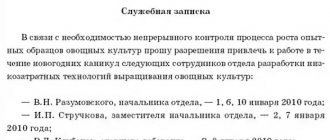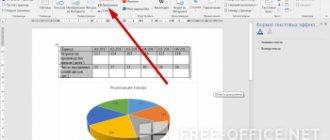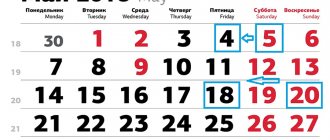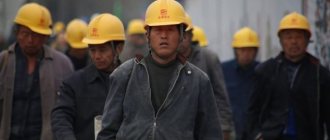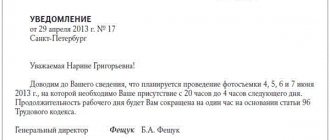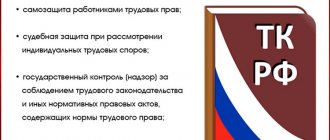Reasons
They are established by Part 3 of Art. 113 Labor Code of the Russian Federation. It is permitted to involve personnel in work on a weekend/working day at the initiative of the employer without the consent of the employees:
- To prevent industrial disasters/accidents or eliminate the consequences arising in connection with them.
- Prevention of accidents, damage, destruction of property of an enterprise, state or municipality.
- Carrying out work, the need for which is determined by the introduction of a martial law/state of emergency, urgent measures during emergencies and in other cases in which there is a threat to the life or normal existence of the population. Such circumstances, in particular, include fires, famine, floods, epizootics, earthquakes, epidemics, etc.
Features of attracting creative workers to work
Article 113 of the Labor Code of the Russian Federation provides an exhaustive list of workers whose professions are considered to be creative:
- media staff;
- television (cinema, television programs, video filming, etc.);
- music;
- theatrical performances;
- circus performances;
- writers;
- artists;
- etc. The full list can be found in government decree number 252 of April 28, 2007.
That is, these are people whose lives are in one way or another connected with creativity. This includes writers, screenwriters, actors, those who sing and those who write music. As well as journalists, videographers, directors, etc. Not only those who perform on stage, but also those who provide performances from behind the scenes. The work of this category of workers on weekends is contractual. To be more precise, the working conditions of creative workers are determined by the provisions of the labor/collective agreement and/or regulations adopted at the employer’s enterprise.
Creative workers
For these employees, the conditions for engaging in professional activities on a weekend/holiday are established by a contract, collective agreement or local act. Creative workers include employees:
- MASS MEDIA.
- Cinematographic, television and video crews.
- Concert organizations.
- Theaters.
- Circov.
They also include other citizens participating in the performance/creation of works. The involvement of creative professionals in extracurricular activities is carried out in accordance with the lists of their professions and positions approved by the government. In this case, the opinion expressed by the tripartite commission regulating social and labor relations is taken into account.
Additionally
In other cases not specified above, involvement in activities on holidays and weekends is permitted with the written consent of employees, taking into account the opinion of representatives of the elected body of the trade union. This regulation is present in Part 5 of Art. 113 Labor Code of the Russian Federation. It is allowed to carry out work, the suspension of which is impossible for production and technical reasons (with the continuity of the production cycle), caused by the need to provide services to the population, urgent loading and unloading and repair operations. This provision is enshrined in part six of the article under consideration.
Special categories
In accordance with part 7 of Art. 113 of the Labor Code of the Russian Federation, it is allowed to involve women with young children (up to three years old), as well as disabled people, in production activities on weekends and holidays, if this does not harm their health, which must be confirmed by medical documents. The corresponding document is issued in the manner prescribed by federal or other regulations. At the same time, the employer is obliged to familiarize these citizens with the right to refuse to work on a holiday/weekend upon signature. According to Part 8 of Art. 113 of the Labor Code of the Russian Federation, the involvement of personnel in work on rest days is carried out by order of the employer. It is issued in writing.
Written consent
Article 113 of the Labor Code of the Russian Federation allows work on weekends and holidays with the written approval of the employee himself. There is no unified form of the document; the application is written in any form, but with reference to normal health.
Employees working in excess of legal labor standards is called overtime. To be involved in the labor process, an agreement between the employee and the trade union committee is required. Without permission, you can attract on the basis of the conditions set out in Art. 113 Labor Code of the Russian Federation. Minors, disabled people and pregnant women, as well as children under three years of age, are not called to work overtime.
The production document stipulates the circumstances of calling a certain employee to work. At the same time, the appeal must be justified and lawful. Based on Part 8 of Art. 113 of the Labor Code of the Russian Federation are involved in performing labor duties during non-working hours on the basis of a written document. In the event of an emergency, they are summoned by verbal order from the manager before the order is issued. The exit is noted in the time sheet or working time book.
We recommend you study! Follow the link:
Is time off paid for working on a day off?
The norm of the article defines when it is permissible to call workers to work during non-working hours:
- The first part prohibits working on non-working days and holidays.
- The second talks about non-standard situations that give the administration the right to call an employee after receiving his approval.
- The third gives the manager the right to invite subordinates during non-working hours.
- The fourth indicates that the work of persons in the creative process is carried out only on the basis of a collective agreement or labor agreement.
- The fifth lists categories of citizens who are invited outside working hours only with the permission of the trade union committee.
- The sixth provides for the performance of work by persons whose functional duties are necessary, for example, work in a production workshop during an emergency.
- The seventh guarantees the protection of the rights of persons with disabilities and women who have young children under three years of age;
- The eighth serves as the final one and provides for the administration’s obligation to issue an order, which should reflect the increased amount of payment.
Involvement outside working hours is illegal, and the manager cannot put pressure on workers. In this case, the approval of the employee himself is important.
There are categories of production activities where it is impossible to stop the technological process, for example, a steel plant. Organizations that provide services to citizens, gas enterprises, urgent loading and unloading operations.
Despite managers’ compliance with the law, situations arise in judicial practice when a disabled person is fired for not agreeing to work on a day off. The administration did not take into account the fact that the employee was disabled according to a medical certificate. The employee was reinstated based on a court decision with financial compensation for the time of forced absence and compensation for moral damage.
Comments to Art. 113 Labor Code of the Russian Federation
Providing for a ban on the involvement of personnel in production activities on weekends and holidays, the norm in question contains lists of conditions that allow the issue of involving employees on such days at the enterprise. The procedure defined in Art. 113 of the Labor Code of the Russian Federation, refers to rest periods established by a collective agreement, labor legislation, and organizational rules. The rules of the norm apply to weekends, which in enterprises where suspension of activities is impossible are provided on other dates. The procedure for rest in these organizations is established by internal regulations. The rules for attracting personnel on holidays and weekends depend on the nature of the factors requiring the presence of employees at work.
Involvement in work duties during non-working hours
Traditional days off are Saturday and Sunday. National holidays are listed in Art. 112 of the Labor Code of the Russian Federation: January 1-8, February 23, March 8, May 1 and 9, June 12 and November 4. However, in manufacturing enterprises where suspension of the work process is not allowed, a schedule is drawn up without taking such days into account.
Sometimes the manager may invite workers to perform work duties if there is a need for production activities. To call an employee to work, the administration is obliged to warn him in writing and obtain his approval or refusal.
Involvement in the production process is possible without agreement under certain conditions set out in Art. 113 of the Labor Code of the Russian Federation. The performance of labor duties occurs on the basis of an order from the administration, where the worker must sign.
You can be called to work on holidays and outside working hours without approval under the following circumstances:
- to eliminate an emergency or catastrophic situation and eliminate the results;
- when there is a danger of damage or loss of property of the enterprise;
- to carry out work that is associated with extreme situations or military operations;
- when there was a danger to the life and health of citizens;
- for urgent loading and unloading operations.
If there are no such circumstances, the administration has the right to invite workers to work outside working hours with their approval.
Articles 113 and 153 are closely related; the Labor Code guarantees payment for non-working time, as well as overtime at a double rate.
When performing work duties, an increased salary is paid for non-working time. A worker who worked on weekends or holidays may, if desired, be given another day off and compensated for work as usual.
Mothers with children under three years of age, as well as persons with limited physical functions, can work outside working hours, if this does not contradict an official medical opinion.
Emergencies
If they arise, a special procedure for attracting personnel to work, established by the Labor Code of the Russian Federation, is applied. Art. 113 (part three) allows the employer to employ employees in production when a martial law/emergency is declared, a disaster occurs or its threat, as well as in other situations that threaten the normal life of the population. Personnel may be involved in such cases without obtaining consent. In practice, it may be necessary to carry out unforeseen production activities, the immediate implementation of which determines the subsequent stable functioning of the enterprise (IP activity). In such cases, the employer will require the consent of the staff.
Do I need consent to work on weekends and holidays?
Before talking about the possibility of calling a person to work with his consent, it is necessary to define the concept of “day off”. To call an employee to work on his legal day off or holiday, you must first obtain his consent. It must be expressed in writing. People are called to work in order to maintain the normal functioning of the enterprise.
Special condition
In all cases, except those specified in parts three and four of Art. 113 of the Labor Code of the Russian Federation, written consent of employees is required. Additionally, the employer must take into account the opinion of representatives of the elected body of the trade union. As for the production activities specified in Part 6 of Art. 113 of the Labor Code of the Russian Federation, the norm does not contain a direct indication of the obligation to comply with the above instructions. Due to the fact that the list contains activities that are not of an exceptional nature, are not unforeseen, and their implementation relates to the normal conditions of the relevant enterprises (continuously operating, providing services to the population, emergency loading and unloading and repair operations), the involvement of personnel in them on holidays and weekends does not require compliance with these requirements.
Important point
The Labor Code prohibits the involvement of pregnant employees and minor workers in production activities on weekends and holidays. However, in the latter case an exception may be made. It applies to workers in creative professions, professional athletes, professions whose positions are determined by lists approved by the government with mandatory consideration of the opinion expressed by a tripartite commission authorized to regulate social and labor interactions. The guarantees apply to fathers/mothers raising children under five years of age without a spouse, employees with disabled dependents, as well as employees caring for relatives according to medical documents, and trustees/guardians of minors.


